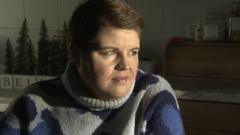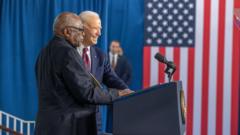As Ireland approaches its general election, a sense of frustration emerges among voters who, despite being part of one of Europe’s top-performing economies, do not see the benefits materializing in their daily lives. Residents, like Emma from County Donegal, highlight concerns over inadequate healthcare for their families and skyrocketing living costs. Despite an impressive budget surplus and the government's promises of improvements, many citizens feel alienated and believe that their local issues, such as deteriorating infrastructure and housing shortages, remain unaddressed. These sentiments fuel skepticism about the political class, with voters expressing feelings of being "forgotten" in the broader economic narrative.
Voters in Ireland Question Economic Prosperity as Election Approaches

Voters in Ireland Question Economic Prosperity as Election Approaches
Many in Republic of Ireland express concerns despite the country's wealth, focusing on pressing issues like housing and healthcare.
In the picturesque County Donegal, constituents feel the pinch of rising living costs and a perceived disconnect from the country's wealth. Emma, a mother of four, articulates her sleepless nights, primarily worrying about the medical needs of her children. Despite the Republic's claims of being one of the richest nations globally—with a projected budget surplus of €25 billion—local voters are troubled by escalating housing prices, inadequate healthcare access, and lengthy waiting lists for essential services.
Local journalist Áine Ní Bhreisleáin mirrors Emma's sentiments, emphasizing the widening gap between governmental assurances of progress and ground realities. Those in rural areas like Donegal feel neglected, grappling with corroding infrastructure and housing crises stemming from defective building materials. As housing prices soar, their situation becomes dire, marked by a reported 58,000 individuals waiting for social housing and a demand for 35,000 new homes annually.
Amidst all this, a surge in immigration adds to the complexity, with Donegal recording a significant number of asylum seekers. Concerns from locals arise about fairness in resource allocation, with many believing that newcomers receive prioritized support. These concerns are echoed by local radio host Greg Hughes, who captures the disconnect felt by many residents and their longing for tangible changes that resonate with their everyday challenges.
People express their frustrations about the disparity in wealth distribution, with Margarite from the Letterkenny Shopping Centre articulating a sentiment of being "gaslighted" by politicians who tout prosperity while rural communities struggle for basic services. As polling day looms, voters are focused on whether their voices can spark a shift to address ongoing concerns, thereby shaping the political landscape and potentially altering the balance of power in the upcoming government.
Local journalist Áine Ní Bhreisleáin mirrors Emma's sentiments, emphasizing the widening gap between governmental assurances of progress and ground realities. Those in rural areas like Donegal feel neglected, grappling with corroding infrastructure and housing crises stemming from defective building materials. As housing prices soar, their situation becomes dire, marked by a reported 58,000 individuals waiting for social housing and a demand for 35,000 new homes annually.
Amidst all this, a surge in immigration adds to the complexity, with Donegal recording a significant number of asylum seekers. Concerns from locals arise about fairness in resource allocation, with many believing that newcomers receive prioritized support. These concerns are echoed by local radio host Greg Hughes, who captures the disconnect felt by many residents and their longing for tangible changes that resonate with their everyday challenges.
People express their frustrations about the disparity in wealth distribution, with Margarite from the Letterkenny Shopping Centre articulating a sentiment of being "gaslighted" by politicians who tout prosperity while rural communities struggle for basic services. As polling day looms, voters are focused on whether their voices can spark a shift to address ongoing concerns, thereby shaping the political landscape and potentially altering the balance of power in the upcoming government.





















